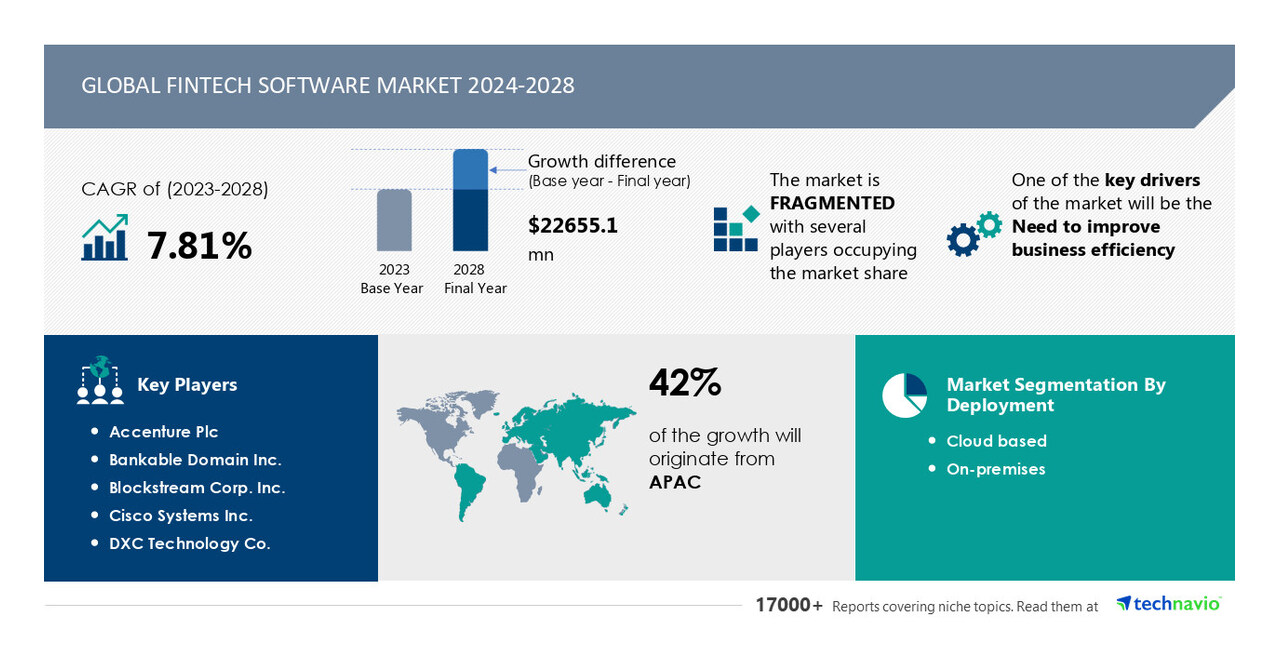Fintech
Fintech software market size is set to grow by $22.65 billion during 2024-2028, the need to improve business efficiency to stimulate the market, Technavio

NEW YORK , June 12, 2024 /PRNewswire/ — The global fintech software market size is estimated to grow by $22.65 billion from 2024-2028, according to Technavio. The market is estimated to grow at a CAGR of 7.81% during the forecast period. The need to improve business efficiency is driving market growth, with a trend towards increasing demand for data integration and visual analytics. However, privacy and data security concerns pose a challenge. Major market players include Accenture Plc, Bankable Domain Inc., Blockstream Corp. Inc., Cisco Systems Inc., DXC Technology Co., Fingent, Hewlett Packard Enterprise Co., Infosys Ltd., Intel Corp., Intellectsoft LLC, International Business Machines Corp., iTechArt Group Inc., LeewayHertz, Microsoft Corp., Oracle Corp., Praxent LLC, Red Hat Inc., SAP SE, SAS Institute Inc. and Serokell OU.
Technavio has announced its latest market research report titled Global Fintech Software Market 2024-2028
Get detailed analysis on regions, market segments, customer landscape and companies- View the snapshot of this report
|
Fintech software market scope |
|
|
Report coverage |
Details |
|
Reference year |
2023 |
|
Historical period |
2018-2022 |
|
Forecast period |
2024-2028 |
|
Momentum of growth and CAGR |
Accelerates at a CAGR of 7.81% |
|
Market growth 2024-2028 |
22655.1 million dollars |
|
Market structure |
Fragmented |
|
YoY growth 2022-2023 (%) |
7.24 |
|
Regional analysis |
North America, APAC, Europe, South America, Middle East and Africa |
|
Contribution to the running market |
APAC at 42% |
|
Key countries |
United States, China, Japan, United Kingdom and France |
|
Profiling of the main companies |
Accenture Plc, Bankable Domain Inc., Blockstream Corp. Inc., Cisco Systems Inc., DXC Technology Co., Fingent, Hewlett Packard Enterprise Co., Infosys Ltd., Intel Corp., Intellectsoft LLC, International Business Machines Corp., iTechArt Group Inc., LeewayHertz, Microsoft Corp., Oracle Corp., Praxent LLC, Red Hat Inc., SAP SE, SAS Institute Inc. and Serokell OU |
Market drivers
Fintech software plays a crucial role in enabling businesses to integrate and analyze large amounts of data from various sources for informed decision making. Its real-time capabilities facilitate data monitoring, transformation and distribution, bridging the gap between business and IT. With increasing globalization, fintech software helps connect people and systems around the world.
Companies integrate fintech with business analytics software and visual analytics tools for dynamic data representation, highlighting key metrics through charts and graphs. These factors contribute significantly to the growth of the fintech software market.
The Fintech software market is experiencing significant growth with various technologies and regulations shaping its landscape. Regtech is a key trend, focused on regulatory compliance through automation and artificial intelligence. Securitization is another trend, with companies using technology to create and trade financial securities. Blockchain technology is also transforming the industry, providing secure and transparent transactions.
Programming languages like R and Python are widely used for Fintech development. Venture capital funding is fueling innovation in areas such as artificial intelligence, capital and fintech infrastructure. Overall, the Fintech software market is dynamic and innovative, driven by technological and regulatory trends.
The research report provides comprehensive data on the impact of the trend. For more details- Download a sample report
Market challenges
- The adoption of fintech software in organizations faces challenges due to data privacy and security risks. Big data and artificial intelligence capabilities enable the monitoring, retrieval, and analysis of data from connected servers, while altering server algorithms.
- Unauthorized access to IT infrastructure and system defects resulting from open source code pose risks. Cloud infrastructure, with its multitenant architecture and shared resources, is particularly vulnerable to hacking attacks and data breaches. These concerns could limit the growth of the fintech software market.
- The Fintech software market is experiencing significant growth, with various solutions and programs emerging. However, this growth comes with challenges. Companies face integration issues when implementing new technologies. Consumer privacy and security are top concerns.
- Additionally, regulations like GDPR and CCPA add complexity. Older systems may not be compatible with new technologies, making modernization a challenge. Furthermore, maintaining and updating Fintech systems can be expensive and time-consuming. Finally, it is essential to ensure scalability and adaptability to changing market conditions. Addressing these challenges requires a strategic approach and continuous innovation.
For further insights into drivers and challenges: Request a sample report!
Segment overview
- Distribution
- 1.1 Cloud-based
- 1.2 On site
- 2.1 Banking
- 2.2 Insurance
- 2.3 Titles
- 3.1 North America
- 3.2 APAC
- 3.3 Europe
- 3.4 South America
- 3.5 Middle East and Africa
1.1 Cloud based- The cloud-based fintech software market is expected to expand significantly during the forecast period. Key factors include cost savings, scalability and innovations in data security. Cloud solutions allow financial companies to store critical data on-premise and rarely used data on public servers, optimizing costs. Additionally, cloud-based software offers flexibility to scale resources as needed, making it an attractive option for organizations. These advantages are expected to fuel the growth of the cloud-based segment in the fintech software market.
For more information on market segmentation with geographical analysis including forecasts (2024-2028) and historical data (2017-2021) – Download a sample report
Research analysis
The Fintech software market is experiencing significant growth, driven by the integration of modern technologies such as artificial intelligence (AI), Blockchain and cloud-based solutions in the financial sector. Application programming interfaces (APIs) play a crucial role in enabling seamless communication between various financial applications and services. Financial institutions, including insurance companies and banks, are leveraging Fintech software to enhance their service proposition, offering consumers innovative savings and investment solutions and other service propositions.
E-commerce sites and mobile banking apps are also integrating Fintech software to streamline transactions and improve customer experience. Regulatory standards set by national regulators and the World Bank ensure the safe and ethical implementation of Fintech solutions in the financial technology landscape. Fintech computer programs and software are transforming the way consumers manage their financial needs, making financial services more accessible and convenient.
Market Research Overview
The Fintech software market is a dynamic and innovative industry that focuses on leveraging technology to improve and automate financial services. This sector includes various applications such as digital payments, lending, wealth management and insurance. The market is driven by factors such as increasing smartphone usage, growing internet penetration and the need for efficient financial solutions. Programming languages such as Python and Java are commonly used in Fintech software development.
Security is a top priority in this industry, as encryption and biometric authentication are essential features. Additionally, regulatory compliance and data privacy are significant concerns. The market is segmented based on application areas and geographical areas. It is expected to grow significantly in the coming years due to the growing adoption of digital financial services.
Summary:
1 Executive summary
2 Market landscape
3 Market sizing
4 Historical dimensions of the market
5 Analysis of the Five Forces
6 Market segmentation
- Distribution
- Final user
- Banking
- Insurance
- Titles
- Geography
- North America
- APAC
- Europe
- South America
- Middle East and Africa
7 Customer landscape
8 Geographic landscape
9 Drivers, challenges and trends
10 The corporate landscape
11 Business analysis
12 Appendix
About Technavio
Technavio is a world-leading company in technology research and consultancy. Their research and analysis focuses on emerging market trends and provides actionable insights to help companies identify market opportunities and develop effective strategies to optimize their market positions.
With over 500 dedicated analysts, Technavio’s report library includes more than 17,000 reports and counting, covering 800 technologies, across 50 countries. Their customer base consists of enterprises of all sizes, including more than 100 Fortune 500 companies. This growing customer base relies on Technavio’s comprehensive coverage, in-depth research and actionable market insights to identify opportunities in existing markets and potential and evaluate their competitive positions within evolving market scenarios.
Contacts
Technavio research
Jess Maida
Media and marketing manager
United States: +1 844 364 1100
United Kingdom: +44 203 893 3200
E-mail: [email protected]
Website: www.technavio.com/
SOURCE Technavio
Fintech
US Agencies Request Information on Bank-Fintech Dealings

Federal banking regulators have issued a statement reminding banks of the potential risks associated with third-party arrangements to provide bank deposit products and services.
The agencies support responsible innovation and banks that engage in these arrangements in a safe and fair manner and in compliance with applicable law. While these arrangements may offer benefits, supervisory experience has identified a number of safety and soundness, compliance, and consumer concerns with the management of these arrangements. The statement details potential risks and provides examples of effective risk management practices for these arrangements. Additionally, the statement reminds banks of existing legal requirements, guidance, and related resources and provides insights that the agencies have gained through their oversight. The statement does not establish new supervisory expectations.
Separately, the agencies requested additional information on a broad range of arrangements between banks and fintechs, including for deposit, payment, and lending products and services. The agencies are seeking input on the nature and implications of arrangements between banks and fintechs and effective risk management practices.
The agencies are considering whether to take additional steps to ensure that banks effectively manage the risks associated with these different types of arrangements.
SUBSCRIBE TO THE NEWSLETTER
And get exclusive articles on the stock markets
Fintech
What changes in financial regulation have impacted the development of financial technology?

Exploring the complex landscape of global financial regulation, we gather insights from leading fintech leaders, including CEOs and finance experts. From the game-changing impact of PSD2 to the significant role of GDPR in data security, explore the four key regulatory changes that have reshaped fintech development, answering the question: “What changes in financial regulation have impacted fintech development?”
- PSD2 revolutionizes access to financial technology
- GDPR Improves Fintech Data Privacy
- Regulatory Sandboxes Drive Fintech Innovation
- GDPR Impacts Fintech Data Security
PSD2 revolutionizes access to financial technology
When it comes to regulatory impact on fintech development, nothing comes close to PSD2. This EU regulation has created a new level playing field for market players of all sizes, from fintech startups to established banks. It has had a ripple effect on other markets around the world, inspiring similar regulatory frameworks and driving global innovation in fintech.
The Payment Services Directive (PSD2), the EU law in force since 2018, has revolutionized the fintech industry by requiring banks to provide third-party payment providers (TPPs) with access to payment services and customer account information via open APIs. This has democratized access to financial data, fostering the development of personalized financial instruments and seamless payment solutions. Advanced security measures such as Strong Customer Authentication (SCA) have increased consumer trust, pushing both fintech companies and traditional banks to innovate and collaborate more effectively, resulting in a dynamic and consumer-friendly financial ecosystem.
The impact of PSD2 has extended beyond the EU, inspiring similar regulations around the world. Countries such as the UK, Australia and Canada have launched their own open banking initiatives, spurred by the benefits seen in the EU. PSD2 has highlighted the benefits of open banking, also prompting US financial institutions and fintech companies to explore similar initiatives voluntarily.
This has led to a global wave of fintech innovation, with financial institutions and fintech companies offering more integrated, personalized and secure services. The EU’s leadership in open banking through PSD2 has set a global standard, promoting regulatory harmonization and fostering an interconnected and innovative global financial ecosystem.
Looking ahead, the EU’s PSD3 proposals and Financial Data Access (FIDA) regulations promise to further advance open banking. PSD3 aims to refine and build on PSD2, with a focus on improving transaction security, fraud prevention, and integration between banks and TPPs. FIDA will expand data sharing beyond payment accounts to include areas such as insurance and investments, paving the way for more comprehensive financial products and services.
These developments are set to further enhance connectivity, efficiency and innovation in financial services, cementing open banking as a key component of the global financial infrastructure.
General Manager, Technology and Product Consultant Fintech, Insurtech, Miquido
GDPR Improves Fintech Data Privacy
Privacy and data protection have been taken to another level by the General Data Protection Regulation (GDPR), forcing fintech companies to tighten their data management. In compliance with the GDPR, organizations must ensure that personal data is processed fairly, transparently, and securely.
This has led to increased innovation in fintech towards technologies such as encryption and anonymization for data protection. GDPR was described as a top priority in the data protection strategies of 92% of US-based companies surveyed by PwC.
Financial Expert, Sterlinx Global
Regulatory Sandboxes Drive Fintech Innovation
Since the UK’s Financial Conduct Authority (FCA) pioneered sandbox regulatory frameworks in 2016 to enable fintech startups to explore new products and services, similar frameworks have been introduced in other countries.
This has reduced the “crippling effect on innovation” caused by a “one size fits all” regulatory approach, which would also require machines to be built to complete regulatory compliance before any testing. Successful applications within sandboxes give regulators the confidence to move forward and address gaps in laws, regulations, or supervisory approaches. This has led to widespread adoption of new technologies and business models and helped channel private sector dynamism, while keeping consumers protected and imposing appropriate regulatory requirements.
Co-founder, UK Linkology
GDPR Impacts Fintech Data Security
A big change in financial regulations that has had a real impact on fintech is the 2018 EU General Data Protection Regulation (GDPR). I have seen how GDPR has pushed us to focus more on user privacy and data security.
GDPR means we have to handle personal data much more carefully. At Leverage, we have had to step up our game to meet these new rules. We have improved our data encryption and started doing regular security audits. It was a little tricky at first, but it has made our systems much more secure.
For example, we’ve added features that give users more control over their data, like simple consent tools and clear privacy notices. These changes have helped us comply with GDPR and made our customers feel more confident in how we handle their information.
I believe that GDPR has made fintech companies, including us at Leverage, more transparent and secure. It has helped build trust with our users, showing them that we take data protection seriously.
CEO & Co-Founder, Leverage Planning
Related Articles
Fintech
M2P Fintech About to Raise $80M

Application Programming Interface (API) Infrastructure Platform M2P Financial Technology has reached the final round to raise $80 million, at a valuation of $900 million.
Specifically, M2P Fintech, formerly known as Yap, is closing a new funding round involving new and existing investors, according to entrackr.com. The India-based company, which last raised funding two and a half years ago, previously secured $56 million in a round led by Insight Partners, earning a post-money valuation of $650 million.
A source indicated that M2P Fintech is ready to raise $80 million in this new funding round, led by a new investor. Existing backers, including Insight Partners, are also expected to participate. The new funding is expected to go toward enhancing the company’s technology infrastructure and driving growth in domestic and international markets.
What does M2P Fintech do?
M2P Fintech’s API platform enables businesses to provide branded financial services through partnerships with fintech companies while maintaining regulatory compliance. In addition to its operations in India, the company is active in Nepal, UAE, Australia, New Zealand, Philippines, Bahrain, Egypt, and many other countries.
Another source revealed that M2P Fintech’s valuation in this funding round is expected to be between USD 880 million and USD 900 million (post-money). The company has reportedly received a term sheet and the deal is expected to be publicly announced soon. The Tiger Global-backed company has acquired six companies to date, including Goals101, Syntizen, and BSG ITSOFT, to enhance its service offerings.
According to TheKredible, Beenext is the company’s largest shareholder with over 13% ownership, while the co-founders collectively own 34% of the company. Although M2P Fintech has yet to release its FY24 financials, it has reported a significant increase in operating revenue. However, this growth has also been accompanied by a substantial increase in losses.
Fintech
Scottish financial technology firm Aveni secures £11m to expand AI offering

By Gloria Methri
Today
- To come
- Aveni Assistance
- Aveni Detection
Artificial intelligence Financial Technology Aveni has announced one of the largest Series A investments in a Scottish company this year, amounting to £11 million. The investment is led by Puma Private Equity with participation from Par Equity, Lloyds Banking Group and Nationwide.
Aveni combines AI expertise with extensive financial services experience to create large language models (LLMs) and AI products designed specifically for the financial services industry. It is trusted by some of the UK’s leading financial services firms. It has seen significant business growth over the past two years through its conformity and productivity solutions, Aveni Detect and Aveni Assist.
This investment will enable Aveni to build on the success of its existing products, further consolidate its presence in the sector and introduce advanced technologies through FinLLM, a large-scale language model specifically for financial services.
FinLLM is being developed in partnership with new investors Lloyds Banking Group and Nationwide. It is a large, industry-aligned language model that aims to set the standard for transparent, responsible and ethical adoption of generative AI in UK financial services.
Following the investment, the team developing the FinLLM will be based at the Edinburgh Futures Institute, in a state-of-the-art facility.
Joseph Twigg, CEO of Aveniexplained, “The financial services industry doesn’t need AI models that can quote Shakespeare; it needs AI models that deliver transparency, trust, and most importantly, fairness. The way to achieve this is to develop small, highly tuned language models, trained on financial services data, and reviewed by financial services experts for specific financial services use cases. Generative AI is the most significant technological evolution of our generation, and we are in the early stages of adoption. This represents a significant opportunity for Aveni and our partners. The goal with FinLLM is to set a new standard for the controlled, responsible, and ethical adoption of generative AI, outperforming all other generic models in our select financial services use cases.”
Previous Article
Network International and Biz2X Sign Partnership for SME Financing
IBSi Daily News Analysis

SMBs Leverage Cloud to Gain Competitive Advantage, Study Shows
IBSi FinTech Magazine

- The Most Trusted FinTech Magazine Since 1991
- Digital monthly issue
- Over 60 pages of research, analysis, interviews, opinions and rankings
- Global coverage
subscribe now
-

 DeFi12 months ago
DeFi12 months agoDeFi Technologies Appoints Andrew Forson to Board of Directors
-

 Fintech12 months ago
Fintech12 months agoUS Agencies Request Information on Bank-Fintech Dealings
-

 News1 year ago
News1 year agoBlock Investors Need More to Assess Crypto Unit’s Earnings Potential, Analysts Say — TradingView News
-

 DeFi12 months ago
DeFi12 months agoSwitchboard Revolutionizes DeFi with New Oracle Aggregator
-

 DeFi12 months ago
DeFi12 months agoIs Zypto Wallet a Reliable Choice for DeFi Users?
-

 News1 year ago
News1 year agoBitcoin and Technology Correlation Collapses Due to Excess Supply
-

 Fintech12 months ago
Fintech12 months agoWhat changes in financial regulation have impacted the development of financial technology?
-

 Fintech12 months ago
Fintech12 months agoScottish financial technology firm Aveni secures £11m to expand AI offering
-

 Fintech12 months ago
Fintech12 months agoScottish financial technology firm Aveni raises £11m to develop custom AI model for financial services
-

 News1 year ago
News1 year agoValueZone launches new tools to maximize earnings during the ongoing crypto summer
-

 Videos6 months ago
Videos6 months ago“Artificial intelligence is bringing us to a future that we may not survive” – Sco to Whitney Webb’s Waorting!
-

 DeFi1 year ago
DeFi1 year agoTON Network Surpasses $200M TVL, Boosted by Open League and DeFi Growth ⋆ ZyCrypto














